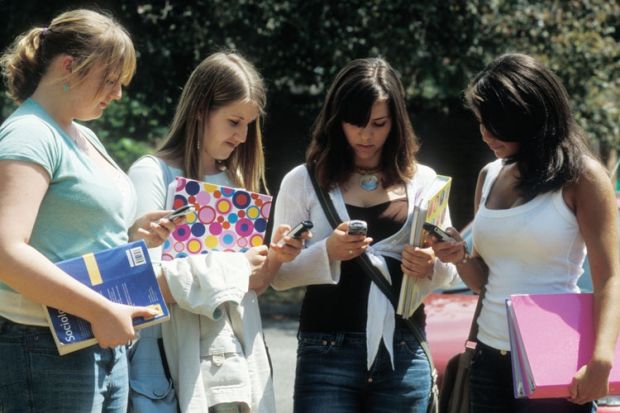United States
Mobile phones: the ‘invisible addiction’
Female students in the US spend an average of 10 hours a day on their mobile phone, while their male counterparts rack up nearly eight, a study at one university has found. Baylor University, a private Christian university in Texas that surveyed 164 students, said that this “invisible addiction” could harm academic performance. James Roberts, Ben H. Williams professor of marketing in Baylor’s Hankamer School of Business, said that for students, mobile phones could “wind up being an escape mechanism from their classrooms”.
Switzerland
Grant uncertainty keeps the foreign students away
Fewer foreign students have enrolled at Swiss universities because of uncertainty over grants after the country was frozen out of Erasmus+ funding, figures show. Switzerland has been suspended from receiving any research and education funds from the European Union after it voted to restrict the movement of EU workers across its borders in a February referendum. The University of Geneva’s intake of foreign students is now down 30 per cent, while there was a similar drop at the University of Fribourg, according to Le Matin Dimanche newspaper.
Latvia
Decline in enrolment forecast for 2014
The Ministry of Education and Science in Latvia is predicting a sharp decline in the number of students for the academic year 2014-15. Citing “mobility of both labour and students” as well as “demographic trends and declining population”, a spokesman estimated that student numbers of 89,633 for 2013-14 would fall to between 83,000 and 85,000 in the new academic year. Similar trends are expected at master’s and PhD level.
Argentina
Castro honoured for his ‘revolutionary example’
An Argentinian university has awarded an honorary doctorate to former Cuban leader Fidel Castro. The National University of Lanús said that the award recognised the revolutionary’s humanitarian work and his pro-Latin American stance. Rector Ana Jaramillo said that Mr Castro “taught and continues to teach” by revolutionary example. A Cuban democratic organisation condemned the move, the PanAm Post reported on August.
India
President wants innovators, entrepreneurs and collaborators
The president of India has called on universities to become the “drivers of innovation” in the country. Speaking at the convocation of the University of Jammu, Pranab Mukherjee said that universities’ focus should be on collaborative relationships with industry and government. “It is essential that universities create the right environment for promoting entrepreneurship amongst students as well as academicians,” he said. He added that while policies had been made to address this issue, they needed to be implemented effectively to “revitalise and boost the higher education framework in the country”.
Australia
Chief scientist criticises government for lack of strategy
A report by Australia’s chief scientist that calls on the government to develop a long-term strategy for science and innovation has been widely welcomed by sector bodies. In Science, Technology, Engineering and Mathematics: Australia’s Future, published on 2 September, Ian Chubb says that Australia is the only member of the Organisation for Economic Cooperation and Development with no strategy. The diffusion of science and innovation spending across 13 ministerial portfolios has also contributed to a poor commercialisation record, he says.
Register to continue
Why register?
- Registration is free and only takes a moment
- Once registered, you can read 3 articles a month
- Sign up for our newsletter
Subscribe
Or subscribe for unlimited access to:
- Unlimited access to news, views, insights & reviews
- Digital editions
- Digital access to THE’s university and college rankings analysis
Already registered or a current subscriber? Login

